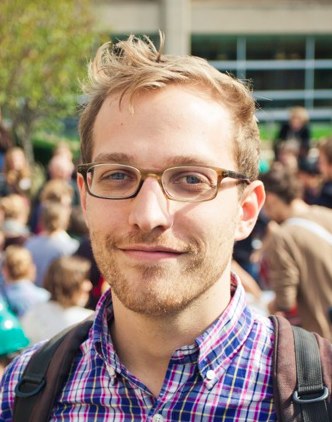Whit Jones attended the Power Shift 2013 summit earlier this week in Pittsburgh. His report is special to BillMoyers.com.

Youth activists march over the Roberto Clemente bridge in Pittsburgh (photo credit: Robert van Waarden)
While marching through the streets of Pittsburgh with 2,500 of my friends at the end of the Power Shift 2013 summit, I could feel something powerful in the air — the youth climate movement is gaining traction through rising solidarity, as our myriad causes come together to fight for justice.
The summit attracted 7,000 mostly college-aged climate activists from around the country looking to end our reliance on coal and natural gas fracking and create a clean energy economy.
From Friday to Sunday we filled the halls of the David L. Lawrence Convention Center participating in over 200 training sessions and workshops, and engaging with each other on how we could make our movement stronger, exploring the frontiers of solidarity, intersecting movements and building true grassroots power. In every room you could hear conversations about how this generation is sticking together and finding common ground in the defense of our future.
But on Monday it was all about action. We kicked things off with a high-energy rally at the Allegheny Landing where over a dozen grassroots leaders reminded us why we were there: Communities across the country are being horribly impacted by dirty fossil fuels and our generation’s collective political and financial power must be used to create a better world.
Deb Thomas of the Wyoming-based Powder River Basin Resource Council started off by urging us to call on President Obama and the Environmental Protection Agency (EPA) to take real action on fracking by re-opening the investigation into fracking water contamination in Pennsylvania, Wyoming and Texas. Over 250,000 petitions have already been sent to the EPA by a coalition of organizations, including Energy Action Coalition and Stop The Fracking Attack, demanding they re-open these critical investigations.
Led by a small marching band, we then began our raucous march across the Roberto Clemente Bridge dropping a massive banner that said “Don’t Frack Our Water” and then continued across Pittsburgh, our voices echoing though the downtown streets, demanding that the biggest corporate polluters end their unjust practices.
We stopped at several PNC Bank branches, demanding that they stop financing mountaintop removal mining, a form of mining that is devastating communities in Appalachia. PNC Bank is one the largest remaining investors in the industry, and the Earth Quaker Action Team out of Philadelphia has been leading a strong campaign demanding they end their dangerous investment practices.
Teri Blanton of Kentuckians of the Commonwealth summed up the collective outrage toward PNC at the rally: “We are here as the face of the many communities impacted by mountaintop removal strip-mining and the short-sighted investment practices of PNC Bank. Our homes are flooded, our water is poisoned, our lungs are filled with dust — all because of mountaintop removal mining. The worst part of it all is that they can’t put it back — they can’t fix the mountain or the streams and that means it’s not only our health that’s compromised, but the health of future generations. That’s what PNC is investing in: the permanent destruction of our health and homeland.”
As a result of our action, over a dozen PNC Bank branches were shut down and seven members of the Earth Quaker Action Team were arrested in acts of civil disobedience. It was yet another sign that our generation is willing to put our bodies on the line until our demands are met — in this case PNC’s divestment from mountaintop removal mining.
From there, we focused on a more local issue. Pittsburgh was the first city in the country to ban fracking, but now Allegheny County Executive Rich Fitzgerald is considering drilling in country parks just outside the city, endangering places where children play and nearby communities. Working with the Pittsburgh-based Shadbush Environmental Justice Collective and the Protect Our Parks Campaign, we showed our solidarity for a critical local campaign.
Ten people occupied County Executive Fitzgerald’s office, as over a thousand of us rallied outside to show our support. Fitzgerald briskly walked by the protest a couple of times, but when asked to schedule a public meeting, he refused to commit and said: “make an appointment.”
Still, the protest at his office was considered a huge success. Ben Fiorillo, 24 from Pittsburgh, a member of the Protect Our Parks Campaign and one the people sitting-in in the County Executive’s office reflected on the day: “County Executive Fitzgerald wants to keep this plan out of public view because he knows that the majority of residents do not want fracking in county parks. He wants to cut a deal with the gas companies and strong arm it through the County Council before public opposition becomes too fierce. What we did was place the spotlight on his plan and expose Mr. Fitzgerald’s contempt of his constituents and of democracy.”
By the end of the day, I had the feeling that this was the generation that would draw a line and say: Our Generation Will Not Be Fracked: not by hydro-fracking, nor by tar sands pipelines, or mountaintop removal, or the “streamline” deportations or Stand Your Ground laws.
We are finding our true power, standing together and demanding justice for all. And our march continues as we return to our campuses and communities, with thousands of people ready to build this movement from the ground up. We must continue to lead the change from the grassroots, because if not us, who will?


